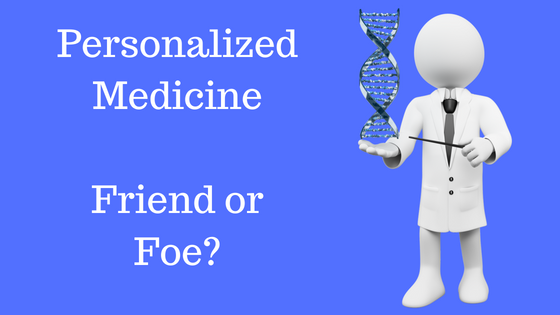One of the most exciting advances in healthcare is the growing field of personalized medicine.
Personalized medicine involves identifying genetic and genomic information that helps predict a person’s susceptibility to developing a particular disease.
This is very powerful information, but only if you know what to do with it.
The first thing you need to know-
Your genes are not your destiny. Genes load the gun, but it’s your environment that pulls the trigger.
That means you have far more power over your destiny than we previously thought possible. Knowing which factors affect genes gives you the opportunity to make better choices, which can dramatically transform your health and your future.
In fact, research has shown that lifestyle and diet can determine 98% of how genes behave, even if the genes are predisposed to act in a certain way.
So, where do you start?
One of the biggest determinants of your genetic future is nutrition.
It is a field of science called nutrigenomics that studies how molecules in food interact with our genes to support or interfere with health.
Food is not just calories or energy. Food contains information that talks to your genes, turning them on or off and affecting their function from one moment to the next.
That means if you come from a family plagued with Alzheimer’s, cancer, diabetes, heart disease or autoimmune conditions, you can stop worrying and start becoming very proactive about the foods you choose to eat.
You have the power to stop that pattern of illness and misery in its tracks simply by giving your body the nutrition it needs.
Making good food choices doesn’t have to be complicated. Since everyone is a little different, the first step should be identifying any food intolerances.
You can do that by following a simple elimination diet that removes common trigger foods as well as chemicals, food dyes, pesticides, trans fats and artificial sweeteners.
Step 2 is equally important. What you add back into your diet is just as critical as what you eliminate.
A healthy diet should include healthy plant-based fats (olive, coconut, walnut, avocado oils) grass-fed beef, wild caught fish, free-range chicken, fruits, vegetables, nuts and seeds.
Other lifestyle changes can also greatly assist your genes to flip on the health sustaining switches.
If you are a smoker, stop this very minute. Limit the use of over the counter and prescription drugs as much as possible. Limiting your use of alcohol is also very important.
Now that the weather is getting warmer, go outside and get some valuable vitamin D from the glorious sunshine. Walk whenever possible. Exercise is something your body needs. It doesn’t have o happen in a gym. Make it fun by choosing an activity you really enjoy.
Manage your stress by taking frequent breaks throughout the day to breathe deeply and de-escalate. Keep breaking the stress cycle instead of letting it build into a crescendo.
Last but certainly not least- get some sleep. Make your bedroom your oasis. Buy darkening shades, turn off all electronics and develop a nightly routine that allows you to easily and gently fall into a deep restful sleep.
Simply put- Eat nourishing foods, get some fresh air, sunlight, exercise, sleep and relaxation and the body’s natural intelligence and healing system will take care of the rest.
For more information- Take THE DIET EVALUATION QUIZ and schedule your free follow-up consultation with Kathy to discuss your results.






